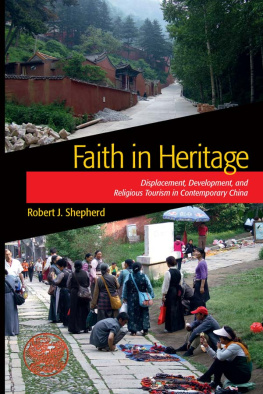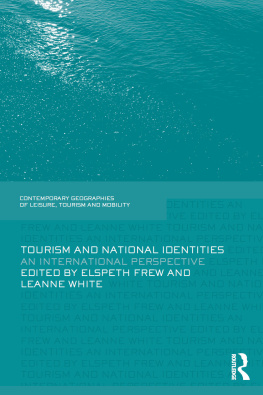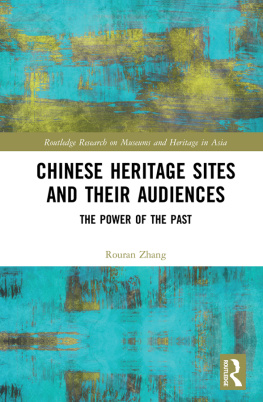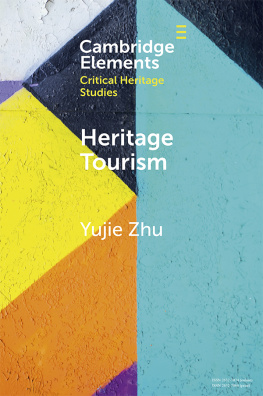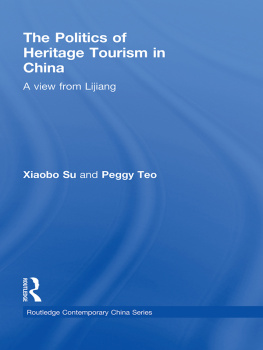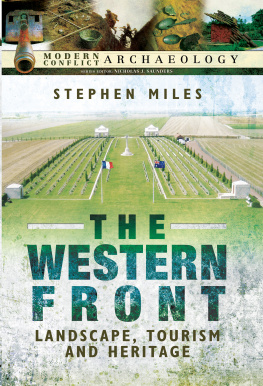
TOURISM, HERITAGE AND NATIONAL CULTURE IN JAVA
Curzon-IIAS Asian Studies Series
Series Co-ordinator: Dick van der Meij
Institute Director: Wim A.L. Stokhof
The International Institute for Asian Studies (IIAS) is a postdoctoral research centre based in Leiden and Amsterdam, The Netherlands. Its main objective is to encourage Asian Studies in the Humanities and the Social Sciences and to promote national and international co-operation in these fields. The Institute was established in 1993 on the initiative of the Royal Netherlands Academy of Arts and Sciences, Leiden University, Universiteit van Amsterdam and Vrije Universiteit Amsterdam. It is mainly financed by The Netherlands Ministry of Education, Culture, and Sciences. IIAS has played an active role in co-ordinating and disseminating information on Asian Studies throughout the world. The Institute acts as an international mediator, bringing together various entities for the enhancement of Asian Studies both within and outside the Netherlands. The Curzon-IIAS Asian Studies series reflects the scope of the Institute. The Editorial Board consists of Erik Zrcher, Wang Gungwu, Om Prakash, Dru Gladney, Amiya K. Bagchi, James C. Scott, Jean-Luc Domenach and Frits Staal.
Images of the Modern Woman in Asia
Edited by Shoma Munshi
Nomads in the Sedentary World
Edited by Anatoly M. Khazanov & Andr Wink
Reading Asia
Edited by Frans Hsken & Dick van der Meij
Tourism, Heritage and National Culture in Java
Heidi Dahles
Asian-European Perspectives
Edited by Wim Stokhof & Paul van der Velde
Law and Development in East and Southeast Asia
Edited by Christoph Antons
The Indian Ocean Rim
Edited by Gwyn Campbell
Rethinking Chinese Transnational Enterprises
Edited by Leo Douw, Cen Huang & David Ip
Hinduism in Modern Indonesia
Edited by Martin Ramstedt
The History of Tibet
Edited by Alex McKay, 3 vols.
Diasporas and Interculturalism in Asian Performing Arts
Edited by Hae-Kyung Um
TOURISM, HERITAGE AND NATIONAL CULTURE IN JAVA
Dilemmas of a Local Community
Heidi Dahles
First published in 2001
by Curzon Press
Richmond, Surrey
http://www.curzonpress.co.uk
Editorial Matter 2001 Heidi Dahles
Typeset in Times New Roman by Dick van der Meij
Printed and bound in Great Britain by
TJ International, Padstow, Cornwall
All rights reserved. No part of this book may be reprinted or reproduced or utilised in
any form or by any electronic, mechanical, or other means, now known or hereafter
invented, including photocopying and recording, or in any information storage or
retrieval system, without permission in writing from the publishers.
British Library Cataloguing in Publication Data
A catalogue record of this book is available from the British Library
ISBN 0-7007-1520-7
Kepada:
R.L.P.
Ikan yang terbang
CONTENTS
Cultural Tourism Policy in Indonesia
Under the New Order Government |
Once it sat firmly in the saddle the New Order government in Indonesia deployed tourism strategically as the engine of modernization. Tourism, in particular international tourism, was supposed to contribute significantly to the development (pembangunan) of Indonesian society, development being defined in terms of measurable growth of the economy as well as political unity and the emergence of a national culture.
Scholars in the field of the politics of tourism have developed partly converging and partly conflicting paradigms regarding the relationship between tourism, politics, and culture. While most scholars agree that tourism is a major symptom of as well as a force behind the process of globalization, they disagree about the effects of the growth of tourism in general and of international tourism in particular on local communities. Whereas some expect international tourism to bring about cultural homogenization and the destruction of local cultures, others believe that tourism development leads to the maintenance and even revitalization of local and ethnic identities. Most scholars, however, tend to underestimate the role of national governments as they believe either in transnational integration or in increasing local autonomy.
In this work, the role of the state and especially the role of the national government in local and regional tourism development will be of central concern. This book looks back on over twenty-five years of tourism politics and policies under the New Order government of former President Suharto, an era in which domestic and international tourism was booming to become Indonesia's first most important economic sector. As will be argued in this book, the New Order government has been strategically promoting the expansion of tourism to implement its political agenda, i.e:
1. Polishing the image of Indonesia and obtaining international esteem in terms of an economically prosperous, politically stable, and culturally advanced country before a world audience through international tourism.
2. Promoting national unity, pancasila ideology and other government-orchestrated values through domestic tourism.
Both aims have cumulated in the policy of quality tourism which offers carefully constructed and controlled tourist experiences provided by the Jakarta-based tourism industry under the control of the Ministry of Tourism, Post and Telecommunications. The New Order tourism policy has proved to be successful: under the six subsequent Five-Year Plans international and domestic tourism has grown considerably indeed. Tourism development hasbenefited from and at the same time contributed to the increasing economic prosperity and the long stretch of political stability under the New Order, both economic prosperity and political stability being important conditions for tourism to prosper.
For a long time the centralist organization of tourism in Indonesia favoured a limited number of well-defined areas for tourism development, particularly the island of Bali and the Special Region of Yogyakarta. The New Order tourism policy channelled investments to these two areas, but failed in its attempts to concentrate tourism developments there, as local small-scale and medium-sized entrepreneurs became involved and facilitated the expansion of tourism all over Indonesia. In tourism research attention has been paid to the ways in which local communities participate in these developments: how ethnic groups and villages not only benefit from but also actively re-construct and revitalize their cultural traditions in the face of increasing numbers of domestic and foreign visitors. Scholars studying local responses to tourism point out that the revitalization of ethnic and local culture within the framework of tourism is problematic in Indonesia: firstly because of the New Order governments propaganda for national unity, and secondly because of the re-emergence of ethnic conflict. To make ethnic revival through tourism even more complex, the same government that is focusing on national unity also recognizes the advantages of ethnic revival for the marketing of Indonesia as a tourist destination of endless diversity. While ethnicizing processes through tourism have recently received ample attention in tourism studies, scholars have failed to analyse the differentiation and inequalities within local communities




